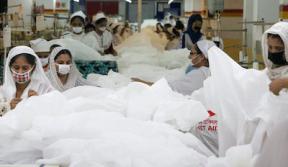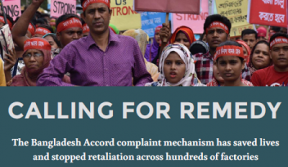Today marks one week until the two-year anniversary of the worst industrial accident to ever hit the garment industry, when the Rana Plaza building in Bangladesh came crashing down. The Clean Clothes Campaign (CCC) and its trade union allies and partners are marking the second anniversary of disaster, with a global call to action, demanding that the Rana Plaza survivors and victims’ families immediately receive the full compensation they are entitled to; and that all apparel brands and retailers doing business in Bangladesh sign the Bangladesh Accord on Fire and Building SafetyToday marks one week until the two-year anniversary of the worst industrial accident to ever hit the garment industry, when the Rana Plaza building in Bangladesh came crashing down.
The Clean Clothes Campaign (CCC) and its trade union allies and partners are marking the second anniversary of disaster, with a global call to action, demanding that the Rana Plaza survivors and victims’ families immediately receive the full compensation they are entitled to; and that all apparel brands and retailers doing business in Bangladesh sign the Bangladesh Accord on Fire and Building Safety.
Despite the growing urgency, brands continue to postpone payments to the Rana Plaza Donors Trust Fund, or make payments that are clearly insufficient to bridge the gap. Additional payments are necessary to fill the current $8.5 million shortfall in the Fund, which would then ensure that the survivors and victims’ families of the Rana Plaza tragedy receive full compensation. To date claimants have only received 70% of what they are owed, with further payments indefinitely delayed as a result of the current shortfall.
This morning Benetton announced paying 1.1 million USD into the Fund, after a massive campaign calling upon them to pay 5 million. “Benetton had a real opportunity to emerge as a leader and prove that their pledges of empathy, understanding, and care for the welfare of the victims were not just some PR spin. Unfortunately, the true colours of Benetton are now revealed” says Ineke Zeldenrust from the Clean Clothes Campaign.
In February Benetton announced they would pay 'within a few weeks' and that they engaged an independent credible third party to determine how much they should pay. Today, Benetton finally revealed this to be global accounting firm PricewaterhouseCoopers (PwC).
The US based World Wide Responsible Apparel Program (WRAP), which Benetton described as an 'NGO working on social compliance endorsed the PwC assessment. WRAP is in fact an industry sponsored social auditing and certification organisation with one of the worst track records in the industry. The Garib and Garib factory for example, that went up in flames, killing people, in Dhaka in 2010, was WRAP certified at the time.
“Benetton again wasted time, spending money on a process in order to try to legitimise their insufficient payment. It’s deeply troubling that Benetton engaged a firm with no track record on human rights issues to lead their process. Red flags need to go off when the PwC assessment is only endorsed by one of the least reputable auditing firms in a very flawed sector. Let’s be clear, Benetton’s process was not transparent. The process excluded all trade unions and labour rights organisation directly involved in compensation efforts in Bangladesh,” says Zeldenrust.
Global actions begin tomorrow, 18 April, in Genova, Italy, where activists in collaboration with the Italian affiliate of the Clean Clothes Campaign, Campagna Abiti Puliti e Fair, will create a concert of sewing machines, a public theatrical art installation. Following the art installation, the public is invited to attend a discussion with documentary filmmakers, Liza Boschin and Elena Marzano, who last year caught Benetton managers defending child labour through secret recordings. Actions will continue next week, leading up to and around 24 April 2015, including in the United States, United Kingdom, Belgium, France, Germany, Spain and Bangladesh. Bangladeshi trade unions and NGOs including the Workers Safety Forum, BLAST, and BILS are planning actions in Bangladesh.
The ILO set up the Rana Plaza Donors Trust Fund in January 2014 to collect compensation for the victims of the disaster. The Rana Plaza Coordination Committee (RPCC), set up in October 2013, was tasked with developing and overseeing the compensation process, known as the Arrangement. The RPCC includes representatives from the Bangladesh government, Bangladesh industry, global brands and retailers, Bangladeshi and international trade unions and Bangladeshi and international Non-Governmental Organisations (NGOs), with the ILO acting as the neutral chair. In the development of the Arrangement the brand representatives refused to set specific payment amounts for each company.
Since the opening of the Fund in January 2014 campaigners have argued that donations should reflect a company’s ability to pay, the size of their relationship with Bangladesh and the extent of their relationship with Rana Plaza. On this basis the CCC have consistently demanded that Benetton pay at least $5 million into the Fund.
Nearly every brand linked to the Rana Plaza building has made insufficient donations, thus failing to live up to their responsibilities to the victims. Some brands, such as Mango, Matalan, and Inditex have refused to disclose their donation. Others, such as Walmart and The Children’s Place, while publicly disclosing their donation, still only contributed a minimal amount.
Benetton’s recent disclosure that they intend to donate $1.1 million to the Fund is a huge disappointment.
“Benetton should know that they and other brands made us suffer all this pain and loosing our beloveds, and now they are coming with this $1.1 million. This is so disrespectful to us and all Rana Plaza victims,” says Latif Sheifh, who lost his wife in the collapse. Latif and other victims’ families and survivors maintain their calls for Benetton to fill the remaining shortfall in the Fund.
“We need to start asking questions as to why out of all the companies with direct links to Rana Plaza only two – Primark and Loblaw - have stepped up in a financially meaningful way, showing that they take their responsibilities seriously, and that they do respect the lives of workers. If all the other companies involved had followed suit, we would not be entering into this funding crisis that we are today, just one week until the anniversary of the disaster and still facing over a 7 million shortfall,” says Ineke Zeldenrust of the Clean Clothes Campaign.
On April 24, 2013, shortly after 8AM, the Rana Plaza building collapsed, when eight storeys of concrete came crashing down, killing 1,134 people. Many were killed instantly. Many others were buried alive, forcing some to amputate their own limbs in order to escape and survive. It is estimated that there were 3890 people in the Rana Plaza building at the time of collapse.
This is a repost of Clean Clothes Campaign's original press release.

